Reviewed by Glenn Erickson
Movies on historical subjects can be interesting just to see how the filmmakers have condensed and converted complex events into acceptable entertainment. Seven Angry Men (1955) is Allied Artists' stab at the story of the abolitionist rebel John Brown, a figure that I daresay is still controversial. Mainstream films (here comes a generalization) avoid hot-button issues or keep them at the periphery, simply because it's assumed that moviegoers want escapist entertainment, not political confrontation. Then again, any movie that complacently accepts the status quo, passively endorses it. We're told that this movie also went out under an alternate title, God's Angry Men. Was that perhaps a substitute for theaters in the Bible Belt?
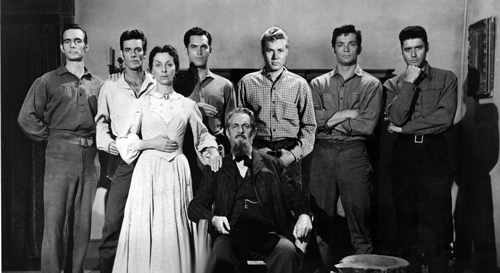
Reviewers would say that Seven Angry Men tries to be fair, when it in truth avoids engaging with its thorny subject. It's against slavery and vigilante violence, but also for The Bible and fighting for one's beliefs. The slavery issue comes to a head in 'Bleeding Kansas' of the late 1850s. Preaching the Wrath of God, abolitionist John Brown (Raymond Massey) leads a group of Free-State abolitionists into the Kansas territory, so they can vote when the measure comes up on the ballot. With his six sons and other volunteers backing him up, Brown fights battles with slave-state bandits. Following the burning of Lawrence Kansas, Brown officiates at the execution of some of his prisoners. Kansas votes against slavery, a victory that should allow son Owen Brown (Jeffrey Hunter) to honor his promise to his new wife Elizabeth (Debra Paget) and return to farming in Ohio. But John Brown has just begun to fight. Convinced that God now want him to end slavery on a national scale, Brown raises funds in the North for an armed insurrection. He plans to seize the armory at Harpers Ferry in West Virginia and rally black slaves to join with him in an all-out holy war. To Elizabeth's dismay, Owen elects to stick with his father on this ill-fated raid.
John Brown is still a rough topic. Basically a Christian fundamentalist terrorist, he's treated with uncommon kindness by the history books, as a good man doing good things in the wrong way. Everyone knows the lyrics that proclaim that 'his truth goes marching on.' One man's Biblical hero is another's violent maniac.
Raymond Massey had played John Brown once before, in the expensive Warners picture Santa Fe Trail (1940). Young officers Jeb Stuart and George Custer (Errol Flynn and Ronald Reagan) are the main characters charged with opposing the fiery rebel. That movie carried a pronounced pro-South bias, and thus characterizes Brown as totally deranged. The fact that Brown quoted scripture doesn't grant him a free pass, and neither does the fact that he cared passionately about freeing the slaves -- the man is a dangerous insurrectionist and has to be put down. A black character in Santa Fe Trail actually says that he has no use for freedom and just wants to get back home to Texas.
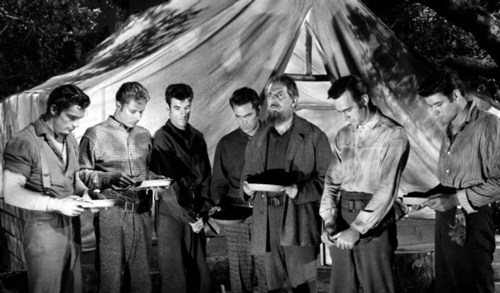
Two wars and fifteen years later, Seven Angry Men comes along, produced not on the tab of a big studio but on a tight Allied Artists budget. The ads make it look like an action western, and executive producer Waler Mirisch even puts a sexy picture of star Debra Paget on the poster with the blurb, "and a tempestuous woman!"
This time around, Massey's John Brown is much a much more likeable man of the cloth, who adores his family even as he commits them to revolutionary violence. Some testimony suggests that Brown is insane, but nothing in the movie supports that interpretation. Daniel Ullman's screenplay portrays him as a monomaniac who cares. Brown loves his sons but considers their lives his to expend. He's the ultimate paternal authority, with Bible in hand. There's no law against God's word. Father Knows Best.
The historical John Brown reportedly executed some of his enemies with a sword, a spectacle that conjures images of modern day Islamic fanatics dealing out unthinkable violence to erect a P.R. shield of fear and dread. The corresponding scene in Seven Angry Men is nowhere near as violent, and also not well dramatized.
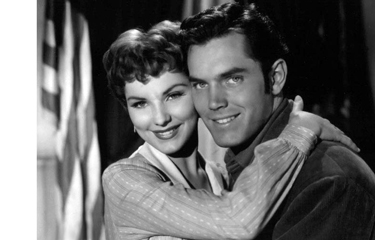
Brown kidnaps and condemns three pro-slave Kansans and orders his boys to stab one with knives. The other two are shot when they try to fight back or flee. The scene is unconvincing, and not just because director Warren had little time to stage it properly -- it's not thought out well enough. The Brown boys are too decent for us to believe they'd kill in this manner. If these killings were really done sober, with words from the Bible, Brown's group must have acted like a cold-blooded, deranged Death Cult. I'd sooner believe that Brown must have first incited his flock into a murderous frenzy. Even then he performed the actual killings himself. If this was done before a mob screaming for vengeance, it's basically a lynching, even with the sanctimonious ritual.
The best thing about Seven Angry Men is the return of Raymond Massey as John Brown. A fine actor when a show requires oracular thunder, Massey can make ordinary dialogue sound 'big'. Elia Kazan did the old-school actor a disservice in East of Eden by setting him up to seem rigid and foolish next to the more naturalistic kid talent represented by James Dean and company. Massey's kinder and gentler John Brown seems less insane, and more deluded by a dangerous radical philosophy.
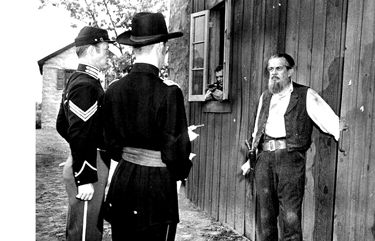
I have a feeling that Massey didn't realize that Allied Artists' tiny production would be so inadequate to the subject matter. 'Bleeding Kansas' was a sprawling, violent episode with major military actions, yet most of the movie is mounted on the poverty level of a budget town-taming western. A tiny rented western street set stands in for the city of Lawrence, Kansas, which then had a population of 2500. The 800 Missourian attackers become maybe 25 for the film. The burning of Lawrence is no more impressive than an average western's booze night, when the cattlemen come to town. When the story relocates to Harper's Ferry in West Virginia, we're still staring at the same rolling hills of Agoura, California. The armory depot is no more substantial than a barnyard with an extra building or two.
19th-century abolitionists would seem to have untapped movie potential but Seven Angry Men isn't really about Civil Rights. John Brown debates slavery but we see only two black men during the course of the show, and neither are slaves. The talented James Edwards is glimpsed several times as one of Brown's group, but nobody asks why he's along for the fight. A guard at Harpers Ferry (Joel Fluellen) is present mainly to tell Owen that no spontaneous uprising of blacks is coming to support their self-appointed emancipator. In this movie, anti-slavery is an issue strictly between abolitionists and their Bibles.
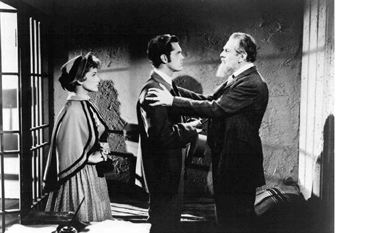
The screenplay instead makes a half-hearted attempt at well-rounded entertainment by adding a conventional romance. Debra Paget's Elizabeth disapproves of the Browns yet moves into their encampment when she falls in love with Owen. Jeffrey Hunter's Owen decides to help his father defy the U.S. government, but he and Elizabeth never discuss the problem. Nobody stands up to a paterfamilias who claims that the authority of God is behind his every decision. 1 None of the other sons have substantial roles. John Smith (of Friendly Persuasion) elects to leave, and falls into the hands of the pro-slavers. Larry Pennell turns vicious to avenge him. James Best fights the good fight, the nervous Dennis Weaver fears for his life and Guy Williams has just enough screen time to show that he's good-looking. Brown's wife Mary (Ann Tyrell) is a non-entity, as are the other women.
Among the large cast is Robert Osterloh as Robert E. Lee, the officer charged with putting down Brown's force at Harpers Ferry. John Lupton has an extended bit as Jeb Stuart. The film's main pro-slavery vigilante is played to the hilt by favorite all-round villain Leo Gordon. But the show still looks like a standard shoot 'em, with generic conflicts like farmers versus cattlemen replaced by militant rebellion. 1955 audiences didn't want murky social history and instead flocked to the untroubled vision of America presented in the giant, colorful musical Oklahoma! What, a Civil War happened? The musical sees only a booming consumer opportunity with peace and happiness for all. 2

The average town-taming western often acknowledges the aftermath of the Bleeding Kansas years, by identifying itinerant gunslingers both good and bad as survivors of Quantrill's Raiders, or as refugees burned off their land, seeking to recover stolen lives. I know of only one film that really communicates the broad scale of this chaotic, despairing pre-war period, when Kansas and Missouri were consumed by the kind of tribal/religious fury presently ripping up the Middle East: Ang Lee's excellent, gotta-see epic Ride with the Devil (1999) with Tobey Maguire and Simon Baker.
A definitive John Brown movie has yet to be made. Although his story is more topical and relevant than ever, I can't see a major studio willing to take on a movie that portrays the truth of a religious maniac who happens to also be a fundamentalist Christian. That description applies to too much of the paying public is too commercially devisive. 3
I chose to review this disc because it stars Debra Paget, and everyone knows that Debra Paget movies are of equal importance with analyzing the history of political terror in film. I can happily report that Seven Angry Men does give actor Raymond Massey a fair shake, at least at the end. John Brown's trial scene consists of little more than a close-up of Massey making a final speech against a stylized courtroom background. He's the whole show at the moment that it counts. The drama is weak and the action patchy, yet Massey holds it together and gives it a finish.

The Warner Archive Collection DVD-R of Seven Angry Men is a good if not exceptional enhanced scan of this B&W movie. It looks good but not particularly sharp. The presentation is much improved by the cropping, which restores cinematographer Ellsworth Fredericks' original widescreen compositions. Contrast is good, as is the audio track.
There are no extras. After looking at various original posters for the movie, such as the artwork used on the disc cover, I have to say I haven't seen any ad artwork this ugly for quite a while.
On a scale of Excellent, Good, Fair, and Poor,
Seven Angry Men DVD-R rates:
Movie: Good
Video: Good
Sound: Very Good
Supplements: none
Deaf and Hearing Impaired Friendly?
N0; Subtitles: None
Packaging: Keep case
Reviewed: May 2, 2015
Footnotes:
1. On the other hand, this sounds like an all-too familiar theme in family dramas. Maybe Seven Angry Men is really just a 'family values' movie: "Little House of Terror on the Prairie."
Return
2. That isn't quite fair, of course ... the play Oklahoma! was a wartime smash that gave a fighting nation a needed optimistic fantasy about the heritage of the West.
Return
3. The parallel of the John Brown story to fundamentalist militarism in the Middle East is grist for many a political argument. Since 9/11 we've been fighting, arresting, detaining without trial and targeting for killing in every way possible (even remote-control murder devices) suspects associated with militant Mideastern Islamic terrorists. Any U.S. citizen aiding them is considered a equal traitor. Where does that put the good church-going abolitionist Northerners that supported John Brown, knowing full well that their donations would fund violent insurrection? Little church congregations were aiding and abetting terror too.
John Brown has one thing more in common with the loathsome cult leader/mass murderer Charles Manson -- both men expected that their violence would inspire blacks to rise up and revolt... with very different goals in mind, of course.
Return

Text © Copyright 2015 Glenn Erickson
See more exclusive reviews on the Savant Main Page.
Reviews on the Savant main site have additional credits information and are often updated and annotated with reader input and graphics.
T'was Ever Thus.
Return to Top of Page
|

